III - SACRED VOCAL MUSIC
Published online by Cambridge University Press: 01 June 2011
Summary
Music in the Catholic liturgy
Musicologists, in some future attempt to reconstruct the history not only of musical style and composition but also of what the listener actually heard, would not be unjustified in asking, paradoxically indeed, whether the composer of greatest significance for seventeenth-century liturgical music were not, in reality, Giovanni Pierluigi da Palestrina (d. 1594). There are no easy answers to this question. The editorial appeal of Palestrina endures, roughly speaking, to the second decade of the new century; latest of all to be reprinted are his hymns (1625, again in 1644 after the textual reforms of Pope Urban VIII – see chapter 12), most frequently published are his settings from the Song of Songs (the most highly impassioned and least severe of all his motet compositions, possibly destined for a function that was more devotional than strictly liturgical) with six editions between 1601 and 1613. But the various sixteenth-century editions of his masses were already well represented in cappelle musicali up and down the Italian peninsula, where they continued to represent a permanent corpus of performable music (surviving copies, indeed, bear every sign of wear and tear). The seventeenth century also gives rise to the myth of Palestrina princeps musicae, ‘restorer and benefactor of music’, as also to the legend which tells how his Missa Papae Marcelli (first published in 1567) was responsible, at the eleventh hour, for convincing delegates to the Council of Trent to desist from the proposal that polyphonic music be banned from liturgical use.
- Type
- Chapter
- Information
- Music in the Seventeenth Century , pp. 105 - 160Publisher: Cambridge University PressPrint publication year: 1987



